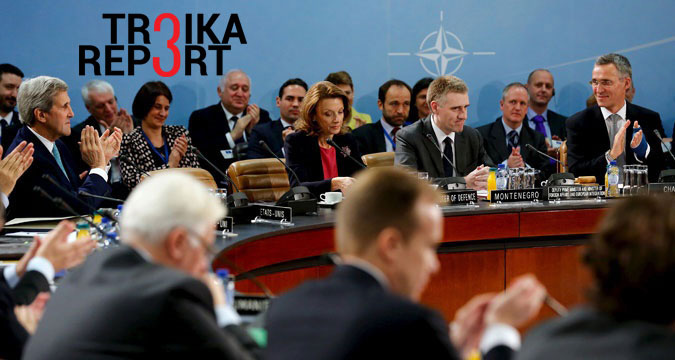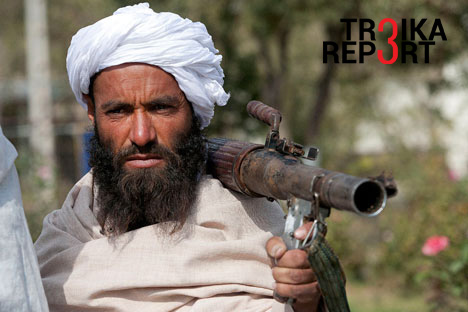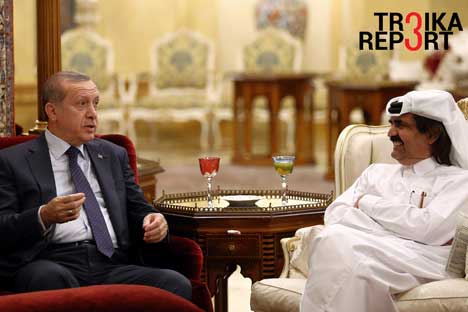Will hybrid warfare doctrine draw NATO and Russia further apart?

U.S. Secretary of State John Kerry (left) and NATO Secretary-General Jens Stoltenberg (right) applaud remarks by Montenegro's Foreign Minister Igor Luksic after Montenegro was welcomed as a new member at the NATO ministerial meetings at the NATO headquarters in Brussels Dec. 2, 2015.
ReutersThe foreign ministers of the NATO nations, conferring in Brussels, have adopted a new hybrid warfare strategy, targeting the so-called “little green men” who gained prominence in 2014 during the Russian takeover of Crimea, in which key buildings were seized by men wearing green uniforms without any insignia. NATO has determined that if there is ever a re-emergence of “little green men” in any member state, it would automatically activate the alliance's Article Five and lead to concerted military action.
NATO Review magazine quoted Peter Pindjak of Slovakia’s Foreign Ministry: “Unlike conventional warfare, the ‘center of gravity’ in hybrid warfare is a target populace. The adversary tries to influence influential policy-makers and key decision makers by combining kinetic operations with subversive efforts. The aggressor often resorts to clandestine actions, to avoid attribution or retribution. Without a credible smoking gun, NATO will find it difficult to agree on an intervention.”
Will the new doctrine facilitate NATO action if someone spots “little green men” or perceives what they believe to be them? What is the new strategy all about? Is it genuinely a response to changes in warfare, or is it merely lip service? Talking to Troika Report, Leonid Ivashov, a retired three-star general and president of the Moscow-based Academy on Geopolitical Affairs, who was formerly a key interlocutor in relations with NATO, claimed the novelty should be “taken seriously.”
“The concept of “hybrid warfare” is simply one element in the policy of containment of Russia. In February, the National Defense Strategy, adopted in the United States, asserted that there is no alternative to American primacy and there is no place for a multi-polar world. In this document Russia is mentioned at least a dozen times as the main security threat to mankind. It is echoed in the British military doctrine, and now NATO has basically supported the same premise.”
– The concept of “hybrid wars,” is this a real novelty?
”The innovation is relative, because the existing U.S. strategies stipulate an assortment of measures which precede military action. They are aimed at weakening any particular government and creating instability. This involves subversive actions targeting the financial system, disrupting the system of administration, etc.”
– What do you make of the hints to revive the NATO-Russia Council?
“This comes amid robust political and psychological pressure on Russia, thus making it feel inferior, a sort of ‘junior’ among the ‘seniors’ of NATO. It is also aimed at domestic audiences in order to show that NATO is open to dialogue.”
How viable is the application of the new NATO strategy? What might be the repercussions for the already strained relations between the Western military and political alliance and Russia? Dmitry Polykanov from the Center for Policy Studies in Russia, a Moscow-based independent think tank, made this comment to Troika Report:
“This doctrine is kind of a NATO response to new challenges and to the new types of war which we have seen not only to the east but also to the south of the alliance’s zone of interest. Russia is only one of the targets. NATO is trying to adapt to the ‘new reality,’ in which there are no official wars and no clear understanding of who is the adversary, and decision-making should be faster, etc.”
– The new “hybrid warfare” is clearly not restricted to Russia but it is Russia that most NATO member states had in mind. The Ukrainian delegation claimed it was taking an active role in shaping the new strategy…
“It is an alarming trend that Russia is becoming more and more the main enemy for NATO. The emergence of the ‘hybrid warfare’ doctrine was largely caused by the developments in Ukraine. NATO was facing a new kind of war, including propaganda, cyber warfare, and non-regular paramilitary units fighting on each side in the conflict. Russia is evidently one of the major reasons for adopting such a strategy, but not the only reason.”
It cannot be overlooked that confusing signals are coming from NATO HQ. On the one hand, the alliance approves the new doctrine, aimed largely at Russia. On the other hand, it does not rule out the resumption of talks within the NATO-Russia Council. The conflicting messages can be interpreted as an adaptation of the alliance, a robust remnant of the Cold War, to the new realities on the ground.
This assumption is shared by Ivan Konovalov, director of the Center for Strategic Trend Studies in Moscow, who pointed out that the “hybrid war” cliché is now fashionable and is often applied without due understanding of its meaning, like in the case of the unrecognized rebel republics of Donetsk and Lugansk in eastern Ukraine.
Talking to Troika Report, Konovalov claimed that disregard of the popular defiance in these two regions of the forceful change of regime in Kiev obscures the causes of the present hostilities. At the same time, he does not see NATO’s new strategy as a formidable obstacle to engaging Russia.
“Hybrid war does not preclude cooperation. It might be used against a strategic adversary who at the same time might have value as a partner on a particular dossier.”
Nevertheless, the solidifying geopolitical threat of Daesh, the self-proclaimed Islamic State (ISIS), striking against targets from Egypt to Paris to London, has only strengthened support for Russia’s air campaign against what it says are terrorists of all brands, including ISIS targets, in Syria.
Notably, Boris Johnson, mayor of London, a Tory MP and pretender to succeed David Cameron as Conservative Party leader, has called on the West to strike a deal with Russian President Vladimir Putin, whom he described as a “ruthless and manipulative tyrant,” for the sake of eradicating the “evil death cult” of ISIS from the territory it now controls in Syria and Iraq.
Whether the old-new NATO doctrine of hybrid warfare will deter cooperation with Russia in the battle against ISIS remains to be seen, however.
Read more from Troika Report>>>
Subscribe and get RBTH best stories every Wednesday
All rights reserved by Rossiyskaya Gazeta.
Subscribe
to our newsletter!
Get the week's best stories straight to your inbox

